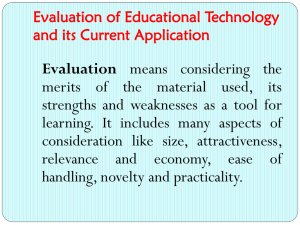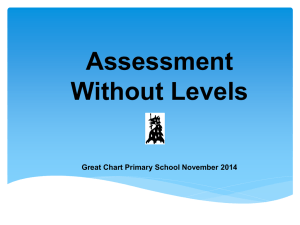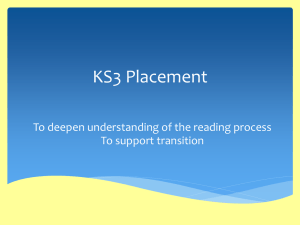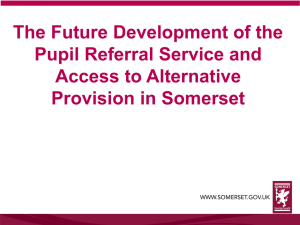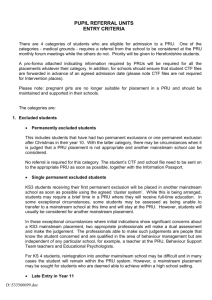Plan
advertisement
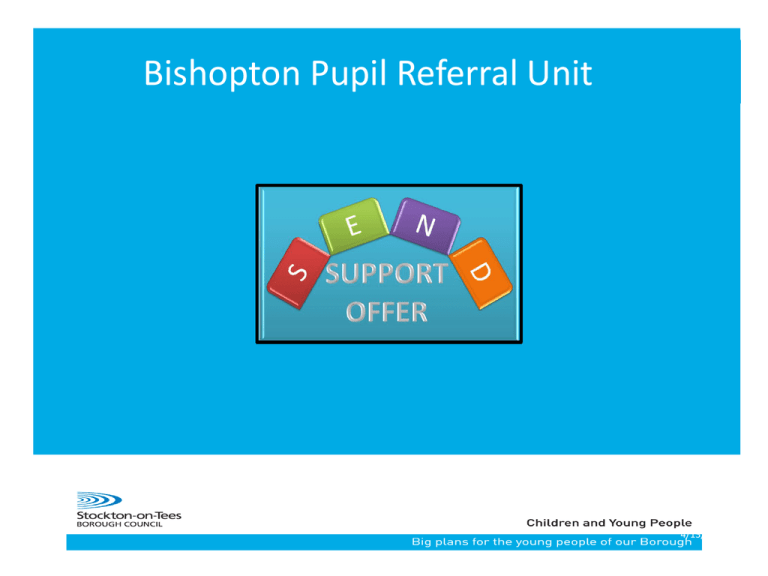
Bishopton Pupil Referral Unit 1 4/13/2015 • Prior to a pupil beginning a placement at the Bishopton pupil referral unit a pupil information passport is completed by the home school. This includes information about their educational and medical needs. • All pupils complete a baseline assessment during their first week of entry into the PRU. This informs us at what level the child is currently working at in English and Maths. • We also complete a baseline assessment known as the Boxall profile this provides an assessment of their behaviour for learning needs. • If you would like to know more about SEND in our school you can contact your child’s mentor or Carly Beecroft (lead mentor) More information • We arrange a meeting every six weeks to discuss pupil progress at the PRU. Invited to the meetings are the home school, parents and appropriate outside agencies. • During this meeting we will discuss interventions that have been used and their impact on the child’s progress. • We work closely with outside agencies to ensure a holistic approach to your child’s education. The mentoring team would be happy to discuss this further. • We operate an open door policy – parents are welcome to contact the PRU at their convenience. • Staff are happy to signpost you to further information as required More information • We work in very small teaching groups at the Bishopton Pru . • All children are taught a bespoke curriculum that is carefully matched to their individual learning needs. • All pupils have an identified form tutor and teaching assistant. who remains with the children throughout the school day. Day to day progress can be discussed with your child’s class teacher. • The senior management team hold pupil progress meetings every half term to discuss pupil progress and discuss the impact of any identified intervention. • The outcome of the pupil progress meetings are shared with school and parents at the six week review meeting. More information • At the Bishopton PRU we deliver education to pupils who cannot access school for medical reasons on our Redhill site. • KS2/3 pupils attend the Billingham site, a number of which have been permanently excluded from their mainstream school. • KS4 pupils attend the Aspire site based in central Stockton . Pupils in KS4 access bespoke programmes that involve vocational and academic elements depending on their aspirations and individual learning needs. • Some pupils attend the PRU for short term placements to prevent them for being permanently excluded, they attend both Aspire and the Billingham site depending on their age. More information • • • • • • • • We will be following the SEN code of practice when preparing our school offer. If you would like to read further information on the SEN code of practice you can follow this link: All pupils are assessed in Maths and English at the end of every half term. We use a system called ‘assertive mentoring’ Assertive mentoring helps staff and pupils to identify the gaps in their learning. Intervention is offered in the first instance by the child’s class teacher through quality first teaching. Where a child needs further support and guidance we have a teacher identified to offer targeted intervention support. A number of staff are trained in specific intervention programmes such as read, write, Inc. Interventions that have been identified will be discussed at your child’s six week review. Assessments are carried out in KS4 to ensure appropriate access arrangements are made for your child. For more information follow this link: JCQ If you need support or advice from the local authority you can contact the parent partnership officer on: Finally if you would like to see the support available from Stockton borough council for pupils with SEND you can follow this link: • • • • • • • Staff at the Bishopton PRU are highly skilled and well trained. Following our detailed assessment process, teachers plan personalised lessons for each individual child. We ensure that learning activities are adapted to the needs of the child. Examples include; children have access to ICT equipment, differentiated teaching materials and staff take account of individual learning styles. Our high staff to pupil ratio ensures that children have access to 1:1 and small group teaching throughout the school day. Pupils have weekly mentoring sessions and can access our in school counselling service. To enrich the curriculum, activities are planned for a Friday afternoon, these include; ICT club, sports activities and a health and beauty workshop. Further information can be found on our website in the curriculum section. • • • • We are a specialist school working with children that cannot access school due to either their medical conditions or behaviour. Therefore he school has many systems and procedures in place to ensure the successful placement of your child. However where further adjustments are necessary please contact either the child’s class teacher or mentor. We hope to encourage all children to take part in off site learning activities. A risk assessment is completed for each individual child, where adjustments need to be made these will be discussed with parents on an individual basis. We can offer a number of intervention strategies. Where intervention programmes have been identified staff are trained to deliver the programme in school. Mrs Boston is our teacher in school who is responsible for organising the appropriate intervention. Intervention programmes that cannot be offered in school can be discussed at the six weekly review meetings. These may be purchased or access organised through other agencies where appropriate. • • • • • • Pupils are assessed every half term in Maths, English and behaviour for learning. Pupils will meet with their tutor/teaching assistant in their class on a weekly basis to discuss their achievements and their areas for development The academic level that your child is working at is saved in our school management system called SIMs. The PRU senior management team along with the class teachers review the assessments every half term. We check that the child is making at least expected progress for their age and ability. Where a child is not making expected progress we discuss the appropriate intervention. This can include 1:1 sessions, specific equipment or further mentoring sessions. The impact of the intervention is monitored throughout the half term and discussed at the next pupil progress meeting. The outcomes of the pupil progress meeting will be shared with parents at the six weekly review meetings with the home school, included school reports and during parents open days. Communication and Interaction • Access to small group and/or individualised interventions to develop skills in communication, interaction, emotional awareness, self care, flexible thinking. • Access to low stimulus area • Modifictions to lunch and/or break times • Enhanced access to additional aids • Access technology • Careful planning of transitions • Mentoring and/or buddy systems Cognition and Learning • Regular, individually focused intervention • Increased access to small group support • Practical aids for learning e.g. table squares, time/number lines, pictures, photos • Read, Write Inc • Increased access to ICT • Flexible groupings • Enhanced access to technical aids e.g. spell checker, ICT software and/or hardware • Adaptations to assessments to enable access e.g. readers, scribe, ICT • Curriculum will be adapted to meet the learning needs of the child/young person • Frequent repetition and reinforcement. Social, Emotional and Mental Health Difficulties • Access to time out/individual work area • Mentoring • Individualised rewards system • Access to counselling services • Increased access to additional adults in the classroom • Supported careers programmes • Alternative curriculum opportunities • Opportunities to develop Social Emotional Aspects of Learning Sensory and/or Physical Needs • Access to a specialist teacher/LSA for the hearing/visual impaired. • Concrete apparatus available to support learning • Access to support for personal care • Therapy programmes delivered in school, designed by specialists e.g. Occupational Therapists, Physiotherapists • Adapted curriculum to enable full access e.g. alternative recording devices, modified PE curriculum
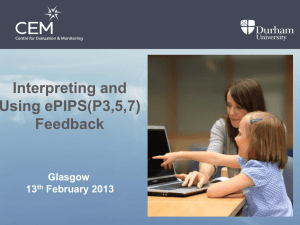



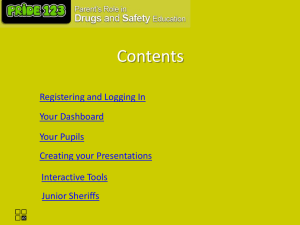
![afl_mat[1]](http://s2.studylib.net/store/data/005387843_1-8371eaaba182de7da429cb4369cd28fc-300x300.png)
